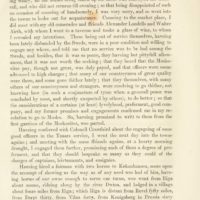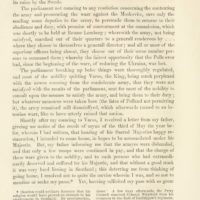![1661] DIARY OF PATRICK GORDON. 33 sence of the King 1661] DIARY OF PATRICK GORDON. 33 sence of the King](https://cdn2.picryl.com/photo/1699/12/31/1661-diary-of-patrick-gordon-33-sence-of-the-king-a87f39-1024.jpeg)
Related
![1686] DIARY OF PATRICK GORDON. 135 delivered of a daughter ; wlierefor, the King](https://cdn2.picryl.com/thumbnail/1699/12/31/1686-diary-of-patrick-gordon-135-delivered-of-a-daughter-wlierefor-the-king-39f486-200.jpeg)
1686] DIARY OF PATRICK GORDON. 135 delivered of a daughter ; wlierefor, the King
![1654] DIARY OF PATRICK GORDON. 15 hoped to have found Duke Radzlvill](https://cdn2.picryl.com/thumbnail/1699/12/31/1654-diary-of-patrick-gordon-15-hoped-to-have-found-duke-radzlvill-e5cc52-200.jpeg)
1654] DIARY OF PATRICK GORDON. 15 hoped to have found Duke Radzlvill

42 DIARY OF PATRICK GORDON. [1661 misfortune

136 DIARY OF PATRICK GORDON. [1686 Queens hand; whereat his Majestic smileing
![1661] DIARY OF PATRICK GORDON. 39 small stock I had ; as for the 1000 reichs dollers promised me](https://cdn2.picryl.com/thumbnail/1699/12/31/1661-diary-of-patrick-gordon-39-small-stock-i-had-as-for-the-1000-reichs-dollers-a537cd-200.jpeg)
1661] DIARY OF PATRICK GORDON. 39 small stock I had ; as for the 1000 reichs dollers promised me
![1661] DIARY OF PATRICK GORDON. 47 good earnest to consider how I might ridd myself of this countrey](https://cdn2.picryl.com/thumbnail/1699/12/31/1661-diary-of-patrick-gordon-47-good-earnest-to-consider-how-i-might-ridd-myself-8dac7f-200.jpeg)
1661] DIARY OF PATRICK GORDON. 47 good earnest to consider how I might ridd myself of this countrey

34 DIARY OF PATRICK GORDON. [1661 hired it ; the lodging or house belonging to that family
![1690] DIARY OF PATRICK GORDON. 171 Most Christian King](https://cdn2.picryl.com/thumbnail/1699/12/31/1690-diary-of-patrick-gordon-171-most-christian-king-1c27ed-200.jpeg)
1690] DIARY OF PATRICK GORDON. 171 Most Christian King
![1699] DIARY OF PATRICK GORDON. 193 ' A number of Strelitzes were executed](https://cdn2.picryl.com/thumbnail/1699/12/31/1699-diary-of-patrick-gordon-193-a-number-of-strelitzes-were-executed-26b730-200.jpeg)
1699] DIARY OF PATRICK GORDON. 193 ' A number of Strelitzes were executed
1661] DIARY OF PATRICK GORDON. 33 sence of the King
Summary
Passages from the diary of General Patrick Gordon of Auchleuchries : A.D. 1635-A.D. 1699"
1661] DIARY OF PATRICK GORDON.
33
sence of the King, the collours being cariyed bcfor, and throwne downe on
the floore at tli^ Kings feet. They were ordered to do their reverence to
the King as they used to do to the Tzaar, which they refused, especially the
Kniaz Gregory Affonasseovits Koslofsky, who also openly upbraided them
with breach of the capitulation. But he was silenced, and reconducted to
the quarters allotted them. These collours were afterwards, on Corpus
Christi day, caryed in procession to the new towne, to the church dedicated
to the Blessed Margin, with great solemnity.
The Swedish ambassadour, GrafFe Steno Bielke, received satisfaction ;
for albeit the peace had been allowed by a convocation of the estates the
yeare befor, yet it was now fully ratifyed and confirmed.
The newes from the Ukraina, of the confederacy of the armyes, was the
greatest perplexity ; and Lubomirskij, being disgusted, though best able,
yet contributed least to the composeing of this mischieffe, and most because
his method and counsells were not allowed nor followed. And surely no-
thing proceeded from him which did please the court, he being suspected to
act against its interest ; and, even now, they suspected him to be the hote-
feau of the armyes confederacy, whereof at this tyme, he was, without
doubt, guiltles. But, if hereafter, when he was forced into a foreigne
countrey, he fomented the dissension or division betwixt the King and
army, as it is said, I cannot tell : only I say this, which 1 had great reason
and occasion to know, haveing been, in a manner, his domestick, and con-
stantly present at table, and many private discourses, and likewise being
very intimate with his secretaryes and chieffe servants for the space of two
yeares and a halfe, that I never heard, nor could perceive any thing from
him, but setled and constant resolutions to adhere to the setled constitutions
of the realme, a hatred against innovations, a great zeale for the preserva-
tion of the libertyes and priviledges of the people. /. n-i truly he was by na-
ture a great lover of vertue and vertuous persons, and as great a hater of
vice; a good sojour ; a great politician as to the understanding of state
effaires, but no good practicioner, as the event showed ; very prudent and
just in all his private actions. This, in short, I do in verity affirme of this
noble prince.
The Prince Bogoslaw Radziewill went away from the parliament dis-
gusted ; his former behaviour, in the late warrs, being objected to him in
parliament by some of the senatours ; he being forbidd also to let his chap-
laine preach in his lodging, because it belonged to the church, he haveing
Gordon was brought up and remained a lifelong Roman Catholic, at a time when the Church was being persecuted in Scotland. At age of fifteen, he entered the Jesuit college at Braunsberg, East Prussia, then part of Poland. In 1661, after many years experiences as a soldier of fortune, he joined the Russian army under Tsar Aleksei I, and in 1665 was sent on a special mission to England. After his return, he distinguished himself in several wars against the Turks and Tatars in southern Russia. In recognition of his service he was promoted to major-general in 1678, was appointed to the high command at Kiev in 1679, and in 1683 was made lieutenant-general. In 1687 and 1689 he took part in expeditions against the Tatars in the Crimea, being made a full general. Later in 1689, a revolution broke out in Moscow, and with the troops under his command, Gordon virtually decided events in favor of Peter the Great against the Regent, Tsarevna Sophia Alekseyevna. Consequently, he was for the remainder of his life in high favor with the Tsar, who confided to him the command of his capital during his absence from Russia. In 1696, Gordon's design of a "moveable rampart" played a key role in helping the Russians take Azov. One of Gordon's convinced the Tsars to establish the first Roman Catholic church and school in Muscovy, of which he remained the main benefactor and headed the Catholic community in Russia until his death. For his services his second son James, brigadier of the Russian army, was created Count of the Holy Roman Empire in 1701. At the end of his life the Tsar, who had visited Gordon frequently during his illness, was with him when he died, and with his own hands closed his eyes. General Gordon left behind him a uniquely detailed diary of his life and times, written in English. This is preserved in manuscript in the Russian State Military Archive in Moscow. Passages from the Diary of General Patrick Gordon of Auchleuchries (1635–1699) was printed, under the editorship of Joseph Robertson, for the Spalding Club, at Aberdeen, Scotland, 1859.
